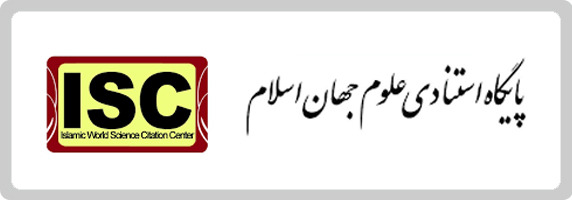مدلیابی اثر صفات شخصیت بر اخلاق کاری با میانجیگری سازگاری شغلی
کلمات کلیدی:
صفات شخصیت, ، اخلاق کاری, سازگاری شغلی, معادلات ساختاریچکیده
هدف این پژوهش، مدلیابی تأثیر صفات شخصیت بر اخلاق کاری با نقش میانجیگرانه سازگاری شغلی در میان کارکنان قوه قضاییه جمهوری اسلامی ایران است. پژوهش حاضر به شیوه توصیفی-همبستگی و با استفاده از مدل معادلات ساختاری انجام شد. جامعه آماری شامل کلیه کارکنان حوزه ستادی قوه قضاییه و پژوهشگاه قوه قضاییه بود که از میان آنها 108 نفر با روش نمونهگیری دردسترس انتخاب شدند. برای جمعآوری دادهها از سه پرسشنامه استفاده شد: پرسشنامه صفات پنجگانه شخصیت نئو (NEO-FFI)، پرسشنامه اخلاق کاری پتی، و پرسشنامه سازگاری شغلی داویس و لافکوایست. دادهها با استفاده از نرمافزارهای SPSS و LISREL تحلیل شدند. نتایج تحلیل مسیر نشان داد که صفات برونگرایی، موافق بودن و باوجدان بودن تأثیر مستقیم و معناداری بر اخلاق کاری دارند. همچنین این سه صفت بهصورت غیرمستقیم نیز از طریق سازگاری شغلی بر اخلاق کاری تأثیرگذارند. در مقابل، صفات روانآزردهگرایی و گشودگی فاقد تأثیر معنادار بودند. شاخصهای برازش مدل، از جمله χ²/df = 1.87 و RMSEA = 0.069، نشاندهنده برازش مطلوب مدل مفهومی بودند. یافتهها نشان میدهند که برخی از صفات شخصیتی میتوانند از طریق افزایش سازگاری شغلی، رفتارهای اخلاقی در محیط کار را تقویت کنند. این نتایج بر اهمیت ارزیابی ویژگیهای شخصیتی در فرایندهای جذب، توسعه منابع انسانی و مداخلات سازمانی تأکید دارند.
دانلودها
مراجع
Alizadegan, L., SamadiLargani, M., & Imeni, M. (2022). The Effect of Personality Type and Professional ethics on Auditors' Ability to Detect Fraud Using the Theory of Planned Behavior by theRole of Professional Skepticism. Financial Accounting and Auditing Research, 54(14), 49-78. https://doi.org/10.30495/faar.2022.693669
Asl, N., Dokaneifard, F., & Jahangir, P. (2022). Presenting a model for predicting emotional divorce based on personality traits and job self-efficacy mediated by perceived social support in working married women. Journal of counseling research. https://publish.kne-publishing.com/index.php/QJCR/article/view/8844
Ayat, M., Mollaei, E., Javanfekr, E., & Shafiee, S. (2020). A Study of Relationship Between Managerial Roles and Personality Traits of Women in Islamic Teachings. Women's Studies Sociological and Psychological, 18(4), 201-238. https://doi.org/10.22051/jwsps.2021.32839.2283
Brenning, K. M., De Clercq, B., Wille, B., & Vergauwe, J. (2020). Towards a fine-grained analysis of the link between borderline personality pathology and job burnout: Investigating the association with work-family conflict. Personality and individual differences, 162, 110030. https://doi.org/10.1016/j.paid.2020.110030
Diefendorff, J. M., Hall, R. J., Lord, R. G., & Strean, M. L. (2000). Action–state orientation: Construct validity of a revised measure and its relationship to work-related variables. Journal of Applied Psychology, 85(2), 250-263. https://doi.org/10.1037/0021-9010.85.2.250
Dilchert, S. (2018). Counterproductive sustainability behaviors and their relationship to personality traits. International Journal of Selection and Assessment, 26(1), 49-56. https://onlinelibrary.wiley.com/doi/abs/10.1111/ijsa.12204
Emami, D., Ahmadi, M., & Ghaffari, R. (2024). Presenting a Pattern of Flexible working Hours in Government Organizations with an Emphasis on Increasing the Productivity Level of Academic Employees in the Ministry of Cooperation, Labor and Social Welfare [Research Article]. Iranian Journal of Educational Sociology, 7(1), 57-65. https://doi.org/10.61838/kman.ijes.7.1.6
Evans, A. M., Meyers, M. C., Philippe, P. F. M. V. d. C., & Stavrova, O. (2021). Extroversion and Conscientiousness Predict Deteriorating Job Outcomes During the COVID-19 Transition to Enforced Remote Work. Social Psychological and Personality Science. https://doi.org/10.1177/19485506211039092
Farajzadeh Dehkordi, H. (2019). How Personality and Gender Relate to Ethical Judgment of Accountants: Evidence based on Discipline [Research]. Iranian journal of Value & Behavioral Accounting, 4(7), 181-208. https://doi.org/10.29252/aapc.4.7.181
Farhangi, A. A., Fotovat, B., Abdarzadeh, P., & Sarhadi Nezhad, M. (2017). The Role of Personality Traits on Job Involvement with Considering Quality of Work life as mediator. Public Management Researches, 10(37), 5-28. https://doi.org/10.22111/jmr.2017.3676
Gholampour, M., pourshafei, h., Farasatkhah, M., & Ayati, m. (2020). Components of Teachers’ Professional Ethics: A Systematic Review Based on Wright’s Model. Journal of Curriculum Studies, 15(58), 145-174. https://www.jcsicsa.ir/article_109377.html
https://www.jcsicsa.ir/article_109377_4d6abb7fa1187f64edb43b332577aed9.pdf
Goodarzi, S., & Hajiha, Zahra. (2018). The Relationship between Personality Characteristics and the Formation of Ethical Judgments [Research]. Ethics in Science and Technology, 12(4), 167-173. http://ethicsjournal.ir/article-1-891-en.html
Jafar Bahadori, K., Touraj Hashemi, N., & Mansoor, B. (2013). The relationship between psychological capital and personality traits with job satisfaction among librarians’ in public libraries in Tabriz. Pajoohandeh, 17(6), 313-319. http://pajoohande.sbmu.ac.ir/article-1-1420-en.html
Kalshoven, K., Den Hartog, D. N., & De Hoogh, A. H. B. (2011). Ethical Leader Behavior and Big Five Factors of Personality. Journal of Business Ethics, 100(2), 349-366. https://doi.org/10.1007/s10551-010-0685-9
Ok, C., Cho, E., & Park, J. (2023). The Impact of Workaholism on Job Satisfaction Depending on Personality: Focusing on the Moderating Role of Conscientiousness. The Institute of Management and Economy Research, 14(4), 217-231. https://doi.org/10.32599/apjb.14.4.202312.217
Pohling, R., Bzdok, D., Eigenstetter, M., Stumpf, S., & Strobel, A. (2016). What is Ethical Competence? The Role of Empathy, Personal Values, and the Five-Factor Model of Personality in Ethical Decision-Making. Journal of Business Ethics, 137(3), 449-474. https://doi.org/10.1007/s10551-015-2569-5
Wahab, M. A. (2017). Investigating the Nexus Between Personality Traits and Islamic Work Ethics. Asian Academy of Management Journal, 22(1), 183-213. https://doi.org/10.21315/aamj2017.22.1.8
دانلود
چاپ شده
ارسال
بازنگری
پذیرش
شماره
نوع مقاله
مجوز
حق نشر 2025 حسین صادق (نویسنده); رضا خاکپور (نویسنده مسئول); عبدالله شفیع آبادی (نویسنده)

این پروژه تحت مجوز بین المللی Creative Commons Attribution-NonCommercial 4.0 می باشد.






